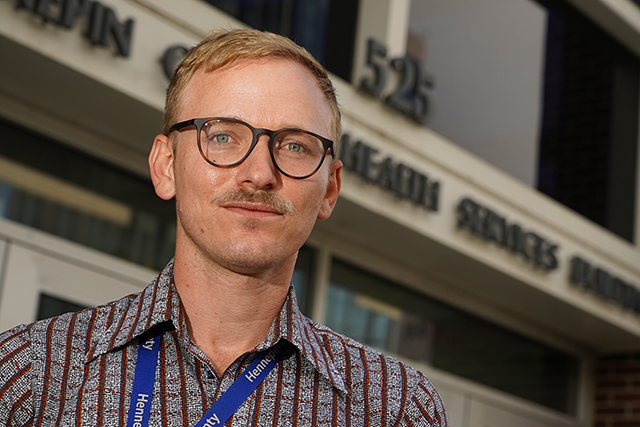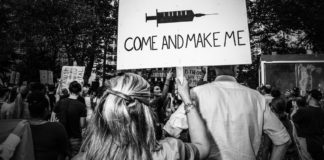
From the start of the monkeypox epidemic, misinformation and public sentiment stigmatized gay communities across the nation.
Dangerously close to sentiment around AIDS more than 40 years ago, health responses have improved, although the stigma around sex, particularly in queer communities, still exists, creating barriers to receiving necessary health care.
Red Door Clinic, which serves a large LGBTQ population, has been focusing on monkeypox education, reaching out to people who are more at-risk and are eligible for vaccines.
“In general, when it comes to sexual health, there historically has been kind of an era of shame and stigma that some patients have had to deal with. So we really want to position ourselves to be kind of a refuge from that, at least when they’re here,” said James Flowers, a community health specialist at the clinic.
The clinic receives funding from the Minnesota Department of Health (MDH) for its Pre-Exposure Prophylaxis (PrEP) medication program, a program that Flowers helps implement, aimed to reduce people’s risk of contracting HIV. Now with monkeypox in the front of people’s minds the clinic is seeing a resurgence in activity.
“We’re getting some patients coming back into the clinic who we previously maybe hadn’t seen in a while. It’s (monkeypox) definitely front and center on a lot of our work here,” Flowers said.
Since Red Door saw its first case on June 24, cases have been increasing, according to the clinic. On Aug. 18, Minnesota had 87 confirmed cases of monkeypox. As of last Friday (Sept. 2), the case count was 130.
Priority vaccination
Along with that increase, there is a limited supply of vaccines. Two vaccines are available in the U.S. to prevent monkeypox, which in Minnesota are being distributed to health systems that already care for people at the highest risk for the disease, according to MDH.
Red Door wants to make sure the vaccine is accessible to people who are at risk for monkeypox, not to be confused with exclusively gay men, which some right-wing media outlets have spread. The patients Red Door sees are aware of the stigma around sex and sexual orientation and are also aware of the impact monkeypox has had on the gay community.
Following MDH guidelines, Red Door’s vaccine supply is for people who do not have monkeypox symptoms and have been exposed in the past 14 days to someone who has been diagnosed with monkeypox or someone who has not received test results back yet but has been told by their provider it is most likely a monkeypox infection.
It is also for people who engage in sex work, and people who identify as gay, bisexual or other men who have sex with men and have had more than one partner in the past 90 days, as well as people who have been deemed at higher risk by a health care provider.
“Most of the patients I’ve spoken with recognize that they want to protect themselves, and they are aware that monkeypox is in the community. They’re reaching out and just wanting to know what they can do to reduce their risk of being exposed and transmission,” Flowers said.
Part of that response is addressing a historical mistrust of the health care establishment, Flowers said. Another strategy is to use technology tools to identify what zip codes, populations and communities the clinic may not be meeting.
The difficulty is the shortage of vaccines.
“We, like other providers, are sort of at the mercy of the available vaccine. We know we need to move on this now from an equity standpoint. James and his teammates doing that work. That’s part of the strategy to hopefully slow the outbreak,” said Allison Thrash, the communications manager for Hennepin County Public Health.
As of Aug. 31, Red Door had administered 2,693 doses of the JYNNEOS vaccine, according to Thrash.
Priority for monkeypox vaccinations are given to people who either live with HIV, have an immune-compromising condition, are on or eligible for PrEP, or are deemed at a higher risk for infection by a clinical source.
Sociological ties to HIV/AIDS epidemic
The stigma of contracting monkeypox is inevitable according to University of Minnesota epidemiologist Kumi Smith. The manner in which the media and society have treated monkeypox draws similarities to HIV/AIDS, Smith said, which she considers one of the most political diseases in the world.
“I think one of the reasons is because the transmission roots for the disease dictate that the people who are most vulnerable to infection are people who take part in what we would call taboo behaviors, so commercial sex, same-sex behaviors, especially among men and then injection drug use,” Smith said. “It’s always been kind of highly politicized in that way.”
How the disease gets spun by media and society has a lot to do with who happens to be impacted first, which in the U.S. was gay men and people who injected drugs, Smith said.
“I think the fact that it was sort of being identified as something more common in men who were having sex with men made it sort of synonymous with this is a so-called ‘gay disease,’” Smith said. “There was a marginalizing of people who were gay, to begin with, and then on top of that, when they start getting this fatal disease (HIV/AIDS), there was even further marginalization because they felt like it was something that gay people could transmit to the rest of the population.”
Monkeypox carries a stigma, too, because of the societal taboos around queerness. The gay community just happened to be the first community that got impacted.
According to Smith, this follows epidemic patterns where the population that an epidemic first happens to get seeded in and then dictates the spread.
“There’s no such thing as a gay disease,” said Smith. “We do have things that we refer to as sexually transmitted diseases, and that doesn’t mean that any kind of sex has the same kind of risk, and so even within sexually transmitted, you might see some groups that are more vulnerable to them, but there’s no such thing as a disease that only transmits among gay people or gay men. If we don’t get on top of this, then there’s no reason, epidemiologically speaking, not to expect that it’ll start to spread in other groups soon.”
For Kat Rahn, the executive director of OutFront Minnesota, the stigma is especially perpetuated in health care systems.
“I think one of the dangers around monkeypox discourse, in general, is that it stigmatizes to some degree behavior that’s seen as riskier behavior. So I think some folks might feel that because of the ways in which it’s being messaged, they would be perceived by health care providers as being more dangerous or risky in their sort of individual actions and might be less willing or eager to disclose that status to folks or to engage fully with health care providers in ways that are helpful and necessary,” Rahn said.
Flowers says he hasn’t heard patients explicitly say they’re concerned about the stigma, although that doesn’t mean there isn’t a stigma associated with monkeypox.
“That’s kind of the nature of stigma, too, is they … might just not come in,” Flowers said.
Government response
How the government handled the AIDS epidemic is at the forefront of providers’ minds now.
“That sort of level of neglect from the government back then in the ‘80s and early ‘90s, I think it has a rippling effect that we have to be aware of as providers and as people in the medical profession, also in sexual health care,” Flowers said. “Just to be aware of that history and to be aware of that and to take steps so our own biases don’t seep into the work.”
Smith said the association of monkeypox and gay men says a lot about society today.
“It shows you there’s a lot of residual stigma towards gay sex. There have been people who have mistaken the early profiles of the early affected people and assumed that it’s either because of their behaviors,” said Smith. “And so people are starting to cite these as their hypotheses, even though they don’t have any evidence, and that’s where I think the stigma’s really showing up.”
HIV is sexually transmitted, while monkeypox was not. Monkeypox is far more transmissible, as it can spread through nonsexual skin-to-skin or face-to-face contact. This difference should be reflected in public policy, Smith said.
“(During the AIDS epidemic), there was a lot of resistance to talk about gay sex at all. And that was a huge problem. In the case of monkeypox, this isn’t really a conversation about sex or what kind of sex we should be having. This is just Disease Prevention 101. We need to inform people how this is transmitted,” Smith said.








